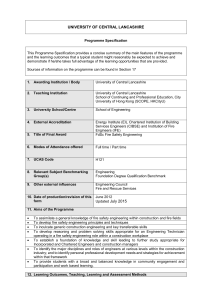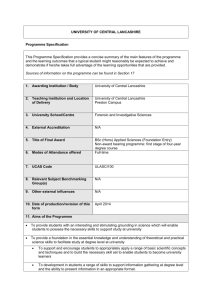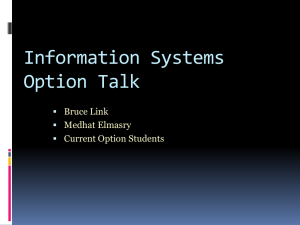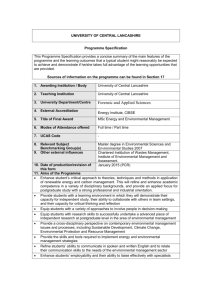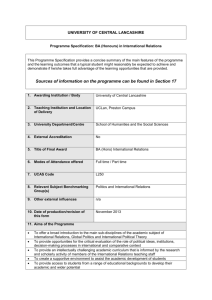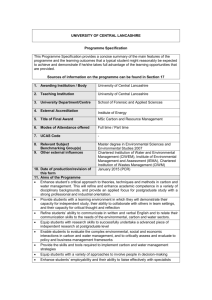BA (Hons) Religion, Culture and Society (June 2015)
advertisement
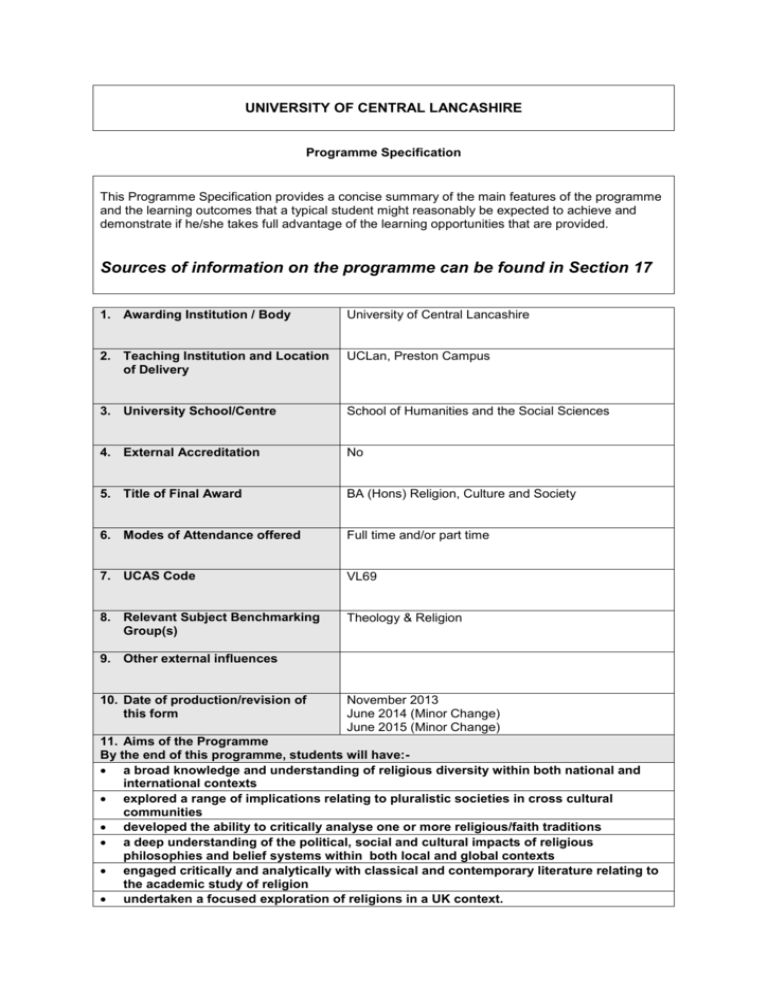
UNIVERSITY OF CENTRAL LANCASHIRE Programme Specification This Programme Specification provides a concise summary of the main features of the programme and the learning outcomes that a typical student might reasonably be expected to achieve and demonstrate if he/she takes full advantage of the learning opportunities that are provided. Sources of information on the programme can be found in Section 17 1. Awarding Institution / Body University of Central Lancashire 2. Teaching Institution and Location of Delivery UCLan, Preston Campus 3. University School/Centre School of Humanities and the Social Sciences 4. External Accreditation No 5. Title of Final Award BA (Hons) Religion, Culture and Society 6. Modes of Attendance offered Full time and/or part time 7. UCAS Code VL69 8. Relevant Subject Benchmarking Group(s) Theology & Religion 9. Other external influences 10. Date of production/revision of this form November 2013 June 2014 (Minor Change) June 2015 (Minor Change) 11. Aims of the Programme By the end of this programme, students will have: a broad knowledge and understanding of religious diversity within both national and international contexts explored a range of implications relating to pluralistic societies in cross cultural communities developed the ability to critically analyse one or more religious/faith traditions a deep understanding of the political, social and cultural impacts of religious philosophies and belief systems within both local and global contexts engaged critically and analytically with classical and contemporary literature relating to the academic study of religion undertaken a focused exploration of religions in a UK context. 12. Learning Outcomes, Teaching, Learning and Assessment Methods A. Knowledge and Understanding A1. Demonstrate knowledge, insight and intellectual engagement with one or more faiths, particularly focusing on UK religions/beliefs/faiths A2. Demonstrate informed insight into historical and contemporary developments as well as key themes in theological thought pertaining to one or more religious traditions, with particular emphasis on culture and tradition within a social context A3. Demonstrate a critical comprehension of classical sources of tradition from one or more religious traditions at different periods of time within various social constructs A4. Demonstrate a critical appreciation of complexity of thought in reference to primary and secondary sources from varying disciplines Teaching and Learning Methods Lectures, Interactive Seminars, Group Work, Presentations, Group & Individual Tutorials, Group and Individual Projects, Research and Independent Study, Fieldtrips, Workshops, e-learning & IT Interaction, Blackboard Learning Support Assessment methods Summative Assessment: Essays, Portfolio, Oral Presentations (group and individual), Project (group and individual), Text/book Review, Reflective Reports, Fieldwork, IT Discussion, Proposals, Research Project, Dissertation – no examinations on any compulsory modules Formative Assessment: discussions and/or debates, self reflection, peer interactive work, reflective portfolio and Personal Development Planning (PDP) which also incorporates reflection on fieldwork experience which is not formally assessed. B. Subject-specific skills B1. Demonstrate informed insight into the multi-faceted complexities of religious beliefs, cultural traditions & practices and the social implications for different communities B2. Engage with integrity and critically reflect on the principles and traditions of different faith/belief systems, demonstrating a sensitive awareness of the positive and negative convictions of different faiths B3. Demonstrate informed insight into differing philosophies and theologies underpinning religious thought and tradition and apply both comparative and critical analysis to these concepts. B4. Demonstrate informed insight into religious influences both on culture and tradition within British societies and how personal and communal identities and motivations are shaped by religion (both constructive and destructive) and how important such identities are. Teaching and Learning Methods Lectures, Interactive Seminars, Group Work, Presentations, Group & Individual Tutorials, Group and Individual Projects, Research and Independent Study, Fieldtrips, Workshops, e-learning & IT Interaction, Blackboard Learning Support Assessment methods Summative Assessment: Essays, Exams, Portfolio, Oral Presentations (group and individual), Project (group and individual), Text/book Review, Reflective Reports, Fieldwork, IT Discussion, Proposals, Research Project, Dissertation. Formative Assessment: discussions and/or debates, self reflection, peer interactive work, reflective portfolio and Personal Development Planning (PDP), which also incorporates reflection on fieldwork experience which is not formally assessed. C. Thinking Skills C1. Demonstrate skills in analytical and critical thinking, particularly in evaluating cultural and religious diversity within a social context, and present that information in written form in an informed and balanced manner. C2. Demonstrate autonomous learning and research skills in identifying and evaluating primary and secondary source materials. C3. Demonstrate the ability to assess and convey diverse opinions, theories and perspectives. C4. Demonstrate skills in the retrieval, utilisation, examination and evaluation of information, specifically relating to the effective use of IT mediums Teaching and Learning Methods Lectures, Interactive Seminars, Group Work, Presentations, Group & Individual Tutorials, Group and Individual Projects, Research and Independent Study, Fieldtrips, Workshops, e-learning & IT Interaction, Blackboard Learning Support Assessment methods Summative Assessment: Essays, Exams, Portfolio, Project (group and individual), Text/book Review, Reflective Reports, IT Discussion, Proposals, Research Project, Dissertation. Formative Assessment: discussions and/or debates, IT interaction (chat/discussion board), Utilisation of Blackboard Learning and LLRS provision (relevant journals/ articles) D. Other skills relevant to employability and personal development D1. Demonstrate the ability to collect and evaluate information from a variety of sources D2. Demonstrate the ability to communicate ideas and arguments effectively to others both orally and in written form. D3. Demonstrate the ability to study independently managing deadlines, and displaying commitment to the principle and practice of life long learning. D4. Demonstrate the ability to work with others as part of a team Teaching and Learning Methods Lecturers, Interactive Seminars, Group Work, Presentations, Group & Individual Tutorials, Group and Individual Projects, Research and Independent Study, Fieldtrips, Workshops, e-learning & IT Interaction, Blackboard Learning Support Assessment methods Summative Assessment: Essays, Exams, Portfolio, Oral Presentations (group and individual), Project (group and individual), Text/book Review, Reflective Reports, Fieldwork, IT Discussion, Proposals, Research Project, Dissertation. Formative Assessment: discussions and/or debates, self reflection, peer interactive work, reflective portfolio and Personal Development Planning (PDP) 13. Programme Structures* 14. Awards and Credits* Level Module Code Module Title Credit rating Level 6 RB3003 RB3001 RB3005 Religion in a Global Village Perceptions of Morality Political Islam and Islamic Movements Dissertation Placement Religion, Media & Culture India, Pakistan, Afghanistan since 1947 : International Conflict & Democracy Global Community Exchange Sexy bodies: gender, sexuality and the body Student Initiated Module Humanity, values & the environment Education in developing countries The Education of vulnerable people Exploring Christian Theology Sacredness & Spirituality Fundamentalism & Cultural Heritage Quranic Studies Student Initiated Module Sociology of Religion Cold War in Asia 1945-1989: History, Society & Conflict Mentoring in the Community Philosophy of Religion Experiential Learning in Educational Settings Sociology of Education 20 20 20 Understanding Religion & Belief Introduction to Judaic & Christian Thought Introduction to Islam Dharma Religions Media and Culture Nations & Empires in Asia: China, India, Japan and Thailand 18571949 An Introduction to British Sign Language Peer Led Outreach Education Knowledge & Freedom Student Initiated Module Introduction to Education Education for Everyone 20 20 RB3990 RB3200 RB3007 HY3054 VO3007 SO3004 ET3981 PI3004 ED3229 ED3215 Level 5 RB2001 RB2241 RB2000 RB2006 ET2981 SO2002 HY2095 VO2001 PI2001 ED2218 ED2205 Level 4 RB1334 RB1013 RB1005 RB1003 SO1004 HY1108 DF1161 VO1008 PI1118 ET1981 ED1201 ED1202 20 20 20 20 20 20 BA (Hons) in Religion Culture and Society Requires 360 credits including a minimum of 220 at Level 5 or above and 100 at Level 6 BA in Religion Culture and Society Requires 320 credits including a minimum of 180 at Level 5 or above and 60 at Level 6 20 20 20 20 20 20 20 20 20 20 20 Diploma of Higher Education in Religion Culture and Society Requires 240 credits including a minimum of 100 at Level 5 or above 20 20 20 20 20 20 20 20 20 20 20 20 20 20 Certificate of Higher Education Requires 120 credits at Level 4 or above Level 4 * Students may also select as an option Language Elective 20 Delete rows not applicable to this Programme Specification 15. Personal Development Planning PDP is embedded into the curriculum through a variety of reflective activities, such as: reflective portfolio work, peer interactive sessions, interactive discussions, tutorial appointments, formative assessment etc. (please see individual module descriptors for full details). Personal Tutorials can be scheduled for students on individual and group basis throughout the programme. 16. Admissions criteria Programme Specifications include minimum entry requirements, including academic qualifications, together with appropriate experience and skills required for entry to study. These criteria may be expressed as a range rather than a specific grade. Amendments to entry requirements may have been made after these documents were published and you should consult the University’s website for the most up to date information. Students will be informed of their personal minimum entry criteria in their offer letter. The University’s standard entry requirements for degree level study in this subject is a minimum of : a) 260-300 points from A2 including GCSE English grade C or equivalent. b) BTEC min. Distinction, Merit, Merit (DDM) c) International students require IELTS 6.5 or equivalent Applications from individuals with non-standard qualifications or relevant work / life experience who can demonstrate the ability to cope with and benefit from degree level studies are welcome. If you have not studied recently you may be invited for interview or need to undertake a foundation entry programme first. For details of those offered by the University, please contact Enquiry Management on 01772 892400. International applications We welcome applications from international students for full-time study and the application procedure previously described should be used. Forms and literature on studying in the United Kingdom are available from the British Council offices or British Embassies throughout the world. You can also find lots of information about living and studying in the UK on the British Council’s website www.educationuk.org. 17. Key sources of information about the programme Prospectus Fact Sheet RCS Web Page Education & Social Science Web Page Course Handbook Web-Site: includes programme information in terms of course content, progression routes, PGCE progression, careers, employability & community support, RCS field trips, the course team, research output etc. 18. Curriculum Skills Map Please tick in the relevant boxes where individual Programme Learning Outcomes are being assessed Programme Learning Outcomes Module Level Code Module Title Core (C), Compulsory (COMP) or Option (O) Knowledge and understanding e.g. LEVEL 6 A1 RB3990 Dissertation RB3001 Perceptions of Morality Political Islam & Islamic RB3005 Movements RB3003 Religion in a Global Village RB3200 Placement Module RB3007 Religion, Media & Culture The Education of Vulnerable ED3215 People Education in Developing ED3229 Countries India, Pakistan, Afghanistan HY3054 since 1947 :International Conflict & Democracy Sexy bodies: gender, SO3004 sexuality and the body Humanity, values & the PI3004 environment COMP COMP COMP COMP O O X Subject-specific Skills A2 A3 A4 B1 X X X X X X X X X X X X X X X X B2 B3 X X X X X X X X X X X X X Other skills relevant to employability and personal development Thinking Skills B4 C1 C2 C3 C4 D1 D2 D3 D4 X X X X X X X X X X X X X X X X X X X X X X X X X X X X X X X X X X X X X X X X X X X X X X O X X X X X X X X O X X X X X X X X X X X X X X X X X X X X O X X O O VO3007 Global Community Exchange O X X X X X X X X ET3981 RB2241 RB2001 RB2006 SO2002 RB2000 e.g. LEVEL 5 PI2001 HY2095 VO2001 ET2981 ED2218 ED2205 e.g. LEVEL 4 RB1334 RB1003 RB1013 RB1005 SO1004 PI1118 HY1108 DF1161 ED1201 ED1202 Student Initiated Module Sacredness & Spirituality Exploring Christian Theology Quranic Studies Sociology of Religion Fundamentalism & Cultural Heritage Philosophy of Religion Cold War in Asia 1945-1989: History, Society & Conflict Mentoring in the Community Student Initiated Module Experiential learning in Educational Settings Sociology of Education Understanding Religion & Belief Dharma Religions Introduction to Judaic & Christian Thought Introduction to Islam Media and Culture Knowledge & Freedom Nations & Empires in Asia: China, India, Japan and Thailand 1857- 1949 An Introduction to British Sign Language Introduction to Education Education for Everyone O COMP COMP COMP COMP X X X X O O X O O O X X X X X X X X X X X X X X X X X X X X X X X X X COMP COMP O O O O O O X X X X X X O O COMP COMP X X X X X X X X X X X X X X X X X X X X X X X X X X X X X X X X X X X X X X X X X X X X X X X X X X X X X X X X X X X X X X X X X X X X X X X X X X X X X X X X X X X X X X X X X X X X X X X X X X X X X X X X X X X X X X X X X X X X X X X X X X X X X X X X X X X X X X X X X X X X X X X X X X X X X X X X X X X X X X X X X X X X X X X X X X X X VO1008 Peer Led Outreach Education O ET1981 Student Initiated Module O Level 4 Language Option O Note: X X X X X X X X X X X Mapping to other external frameworks, e.g. professional/statutory bodies, will be included within Student Course Handbooks X X X X X X X X
